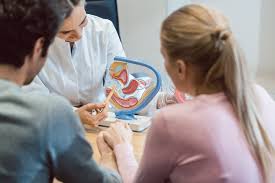Fertility Awareness: Understanding Your Body’s Cycle and Hormones
Fertility awareness seeks to educate the woman on when she can get pregnant. Fertility awareness is a powerful tool for any woman looking to take the next step in understanding her body, her cycle, and her hormones. By tracking her fertility signs, she can gain insight into her reproductive health, gain control over her fertility, and make empowered decisions around contraception and pregnancy. Fertility awareness is a natural, safe, and effective way to monitor fertility, allowing women to track and understand their body’s cycle and hormones in order to accurately predict ovulation and detect their most fertile days. With this knowledge, women can make informed decisions about their reproductive health, including the use of natural contraception and the timing of conception. Please keep reading for details on the following topics:
Ovulation
Fertility tests
Infertility
When to seek urgent medical care

FERTILITY AWARENESS OVERVIEW
Fertility awareness empowers women to comprehend their bodies, menstrual cycles, and hormone fluctuations, aiding in informed decisions regarding contraception and conception. By tracking fertility signs, such as ovulation timing and hormone levels, women gain insight into reproductive health, enhancing control over fertility. With knowledge of fertile days and ovulation periods, women can optimize conception timing and fertility management strategies. Fertility awareness promotes natural, safe, and effective approaches to monitoring fertility, enabling women to make empowered choices regarding reproductive health and family planning.
OVULATION
Ovulation is a key part of the menstrual cycle that occurs each month. It is the process by which an egg is released from the ovary and travels down the fallopian tube, where it may be fertilized by a sperm. During ovulation, the hormone levels in the body, including estrogen and luteinizing hormone, increase, leading to the release of the egg. Ovulation usually occurs about 14 days before the start of a woman’s menstrual period. Understanding ovulation is important for knowing when a woman is most fertile and can help increase the chances of conception.
When ovulation occurs
For a 24-day cycle- day 10
For a 28-day cycle- day 14
For a 35-day cycle- day 21
When can a woman become pregnant- 5 days before the ovulation day or 12 to 16 days before the period begins
When a woman is most fertile- 1 to 2 days before ovulation
How long can sperm survive in the reproductive tract- 3 to 5 days
FERTILITY
Fertility is an important and complex process that affects the lives of millions of people around the world. The ability to conceive and carry a pregnancy to term is a powerful and rewarding experience, but it can also be a difficult journey. There are many factors that can influence fertility, including age, lifestyle, and health. Understanding these factors and how they affect fertility can help couples make informed decisions about their reproductive health. With a better understanding of fertility, couples can work with their healthcare providers to create a treatment plan that is tailored to their individual needs.
FERTILITY TESTS
Fertility tests are an important part of assessing a couple’s reproductive health. It is important to understand the different tests available, their purpose, and the results they provide. The fertility tests available can provide insight into a couple’s reproductive health, whether it is to determine the cause of infertility or to assess the effectiveness of any treatments being used. These tests can help to identify issues and guide the next steps in the process, such as determining the best course of treatment for a couple. It is important to note that each test has its own set of benefits and drawbacks, so it is essential to discuss the tests with a healthcare provider to determine which test is best for a particular situation.
WHEN FERTILITY TESTS ARE DONE
Fertility tests are conducted when individuals face challenges with ovulation, sperm release, irregular menstrual cycles, age over 35, or difficulty conceiving despite regular unprotected intercourse for a year. For example:
- The woman is unable to ovulate
- The man is unable to release sperm
- The woman’s menstrual cycle is irregular
- Older than 35 years
- Unable to get pregnant
TYPES OF FERTILITY TESTS DONE FOR COUPLES

Interview to obtain a health, sexual and drug history
A comprehensive physical examination of the woman’s pelvis and the man’s testicles to assess their health
Semen analysis the check the quality of the semen
Blood tests (thyroid function, luteinizing and progesterone)
X-rays of the womb and fallopian tubes to detect blockages
Ultrasounds to observe inside the body
These tests are vital for assessing reproductive health and identifying potential issues impacting fertility.
TESTS DONE TO DETERMINE WHEN A WOMAN IS OVULATING
Taking the temperature daily
Examining the mucus from the cervix for changes
Predicting ovulation time by using a calendar to track dates
INFERTILITY

Infertility affects around 10-15% of couples in the United States, making it a common issue faced by many. It is defined as a couple’s inability to conceive a child after a year of unprotected intercourse. There are many potential causes of infertility, including genetic, hormonal, anatomical, and lifestyle factors. Treatment options vary and may include medications, surgical interventions, or assisted reproductive technologies. No matter the cause, infertility can cause significant emotional distress and have lasting effects on relationships.
RISK FACTORS OF INFERTILITY PROBLEMS
Age over 35 years old
Abnormalities of the womb
Exposure to toxic substances
Multiple cysts on the ovary
Abnormalities of the reproductive system caused by infections
HOW TO PREVENT FERTILITY PROBLEMS
Preventing fertility problems is a critical topic for anyone considering having a family. Whether you are already trying to conceive or just starting to plan, understanding the steps to take to ensure the best possible outcome is key. This includes making sure to maintain a healthy lifestyle, understanding fertility treatments and options, and seeking guidance from an experienced fertility specialist. With the right knowledge, tools, and support, you can take proactive steps to maximize your chances of achieving a successful pregnancy.
Handy tips to prevent fertility problems include:
Limit exposure to drugs, smoke and toxic chemicals
Limiting alcohol intake
Taking precautions to avoid sexually transmitted infections (STI)
Helping the hormone level normalize by maintaining a healthy weight
HOW FERTILITY PROBLEMS ARE TREATED

Infertility is an issue that affects many couples trying to start a family. Treatment for infertility can be a difficult process, but there are a variety of options available that can help couples achieve their dream of starting a family. In vitro fertilization, fertility drugs, intrauterine insemination, and surgery are all potential treatments that can be used to address infertility. With the help of an experienced healthcare provider, couples can explore their options and find the best treatment for their particular situation.
Using medication to help a woman ovulate
Inserting sperm inside the vagina (Artificial Insemination)
Performing surgery to unblock the fallopian tubes
Stimulating the testes to produce sperm
Mixing the sperm and the egg in a lab then inserting into the woman’s womb (In Vitro Fertilization-IVF)
Modifying the diet
Relaxing exercises
Inserting very tiny needles in specific points in the body by a specialist (Acupuncture)
USEFUL INFORMATION
During the fertile period, the woman can have sex on alternate days to increase the chance of getting pregnant
Products used in the vagina for lubrication that can potentially harm sperm include certain commercial lubricants, especially those containing spermicidal agents like nonoxynol-9. Additionally, some lubricants with high acidity or low pH levels may also have adverse effects on sperm motility and viability. It’s advisable to opt for fertility-friendly lubricants or natural alternatives, such as pre-seed lubricant or mineral oil, to avoid interference with sperm function during conception attempts.
Exercising vigorously may interfere with ovulation in the woman and cause lower sperm counts in the man
The man should avoid soaking in hot tubs which can destroy the quality of the sperm
High fever destroys the quality of the sperm and should therefore be treated
WHEN TO SEEK MEDICAL CARE
It is important to know when to seek urgent medical care, as delaying appropriate treatment can lead to further health complications. If you experience any of the following symptoms, you should seek medical help immediately. If you have any doubts about whether you should seek medical care, it is always better to err on the side of caution and consult with your doctor.
Failure to achieve a pregnancy after trying for at least one year
Age 35 and older with difficulty obtaining a pregnancy
Having problems ovulating
Had 3 or more consecutive miscarriages
Click to check out this book called “Pregnancy Approach” for further insights on fertility.
Disclaimer: The information provided in this content is for general informational purposes only. It is not intended as medical or healthcare advice, diagnosis, or treatment. Always seek the advice of a qualified healthcare professional with any questions you may have regarding a medical condition or healthcare decisions.

